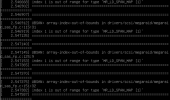Hi,
we are hosting a veeam backup server within proxmox for backing up pour primary VMwXre environment.
The Machine is a Lenovo SR650 with two intel 8 core CPUs and 96G of ram.
The machine consists of 2 Avago MegaRaid controller - one for booting up proxmox and the other passed into the VM for veeam storage.
Also there exists:
an old HP SmartArray P410 controller passed into the same VM for extending the storage (for other purposes)
a Fujitsu Avago CP400e SAS controller passed into the same VM for veean to connect to an LTO8 drive (daily Backup to a tape with around 300 Megabyte / second)
Additionally it has a Lenovo 10G / 25G SFP Card for LAN connection (not passed) and a fibrechannel QLOGIC card (actually not used).
The VM is a german Windows Server 2019 with the current version of veeam backup installed inside. All - even virtual CPUs were assigned to the VM (2 socets - each 16 cores) and 32 Gig of RAM were assigned. It is a q35 v 6.0 VM.
With PVE 7.0 and 7.1 it was working like a charm, the backup of our VMwXre environment took about one hour into the storage and about 5.5 hours to copy it to the tape (about 5 terrabytes)
After upgrading to 7.2 problems started (immediately after the upgrade):
Writing to tape starts with >200 Megabytes / second and drops after round about 15 minutes to solid 20 megabytes / second. While I am able to copy files between the 2 RAID controllers with more than 200 - 300 Megabyte / s the speed to the tape stays solid at 20 Megabyte / s.
Only after a reboot of the VM we gain the full speed for a few minutes again.
Read:
/var/log/syslog
and
dmesg shows no messages in the moment of the drop.
Windows Eventlog tells even nothing.
No other errors detected.
What is going wrong?
Do we need to reinstall the server with 7.1?
Thx
Dirk
we are hosting a veeam backup server within proxmox for backing up pour primary VMwXre environment.
The Machine is a Lenovo SR650 with two intel 8 core CPUs and 96G of ram.
The machine consists of 2 Avago MegaRaid controller - one for booting up proxmox and the other passed into the VM for veeam storage.
Also there exists:
an old HP SmartArray P410 controller passed into the same VM for extending the storage (for other purposes)
a Fujitsu Avago CP400e SAS controller passed into the same VM for veean to connect to an LTO8 drive (daily Backup to a tape with around 300 Megabyte / second)
Additionally it has a Lenovo 10G / 25G SFP Card for LAN connection (not passed) and a fibrechannel QLOGIC card (actually not used).
The VM is a german Windows Server 2019 with the current version of veeam backup installed inside. All - even virtual CPUs were assigned to the VM (2 socets - each 16 cores) and 32 Gig of RAM were assigned. It is a q35 v 6.0 VM.
With PVE 7.0 and 7.1 it was working like a charm, the backup of our VMwXre environment took about one hour into the storage and about 5.5 hours to copy it to the tape (about 5 terrabytes)
After upgrading to 7.2 problems started (immediately after the upgrade):
Writing to tape starts with >200 Megabytes / second and drops after round about 15 minutes to solid 20 megabytes / second. While I am able to copy files between the 2 RAID controllers with more than 200 - 300 Megabyte / s the speed to the tape stays solid at 20 Megabyte / s.
Only after a reboot of the VM we gain the full speed for a few minutes again.
Read:
/var/log/syslog
and
dmesg shows no messages in the moment of the drop.
Windows Eventlog tells even nothing.
No other errors detected.
What is going wrong?
Do we need to reinstall the server with 7.1?
Thx
Dirk


